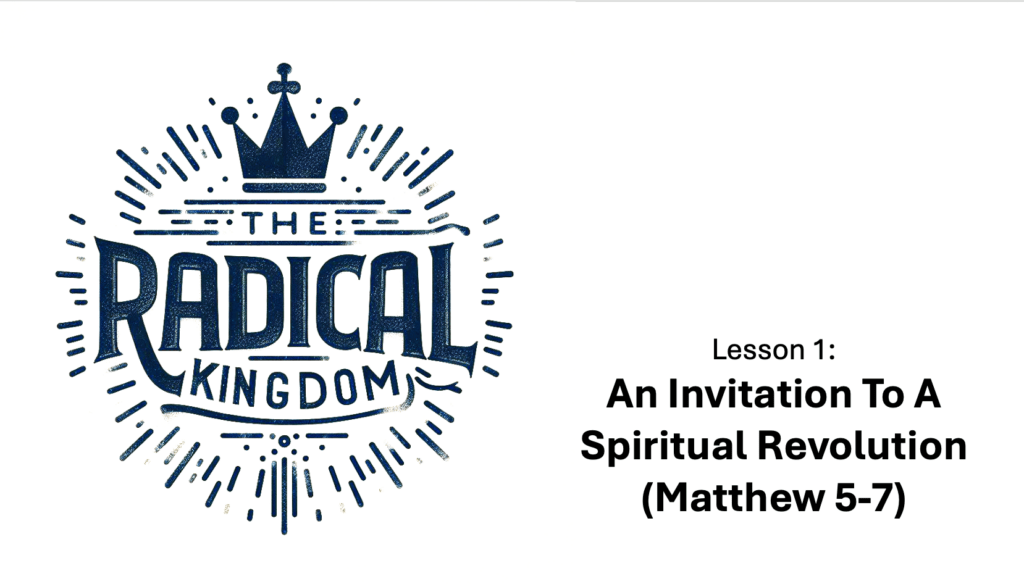Downloadable Files:
Text:
The Radical Kingdom
Lesson 1: An Invitation To A Spiritual Revolution (Matthew 5-7)
The “Sermon on the Mount” (Matthew 5-7) is the most well-known sermon in the history of the world. However, knowing about this sermon and knowing this sermon are two very different things. For, this is a radical sermon in every generation that contains a powerful message about a radical kingdom that is not of this world. Its message is an invitation for people to be part of the spiritual revolution that had now begun – and continues today!
Context For The Sermon
Matthew has recorded Jesus as having gained a large following as He has being teaching the good news about God’s kingdom and healing every kind of disease and sickness among the people (Matthew 4:23-25). Consider the setting in a historical context (5:1-2). The Jews have been waiting for the Messiah (Anointed/Promised One who would be King). However, they were often expecting an earthly king who would restore the earthly kingdom of Israel to its glory days and deliver them from their oppression under the Roman Empire (Isaiah 2:1-4; 9:6-7; 61:1-3; Daniel 2:44). In addition, the Jews who lived under Moses’s law had reduced its observance to mere formality that had drained it of its life and meaning (i.e. under the leadership of a sect of people called “Pharisees”). The “Sermon on the Mount” represents a manifesto of God’s kingdom from the Messianic King. In it, He describes the radical identity of citizens of this kingdom (Matthew 5:3-16), teaches a radical idea of righteousness (5:17-7:12), and presents a radical choice people must make (7:13-27). As you read, listen to, and study this sermon, therefore, you are invited by King Jesus to experience and be part of a spiritual revolution in a radical kingdom!
A Radical Identity (Matthew 5:3-16)
In Matthew 5:3-12, the character that is necessary to be part of God’s kingdom is identified as being radically different from the character celebrated by the kingdoms of the world. In 5:13, those in God’s kingdom must have a purifying and seasoning impact on the world through their righteous living and teaching.In 5:14-16, those in God’s kingdom will live in a way that stands out from and exposes the ways of darkness (unrighteousness) so others may also come to glorify God.
A Radical Idea Of Righteousness (Matthew 5:17-7:12)
In Matthew 5:17-20, rather than coming to overthrow the Old Covenant, Jesus came to fulfill it and demonstrates that a superior righteousness is required to that of the scribes and Pharisees. In 5:21-26, Jesus begins a series of six case studies in true righteousness, demonstrating that righteousness concerning murder involves not being angry with others and seeking reconciliation with those who have something against you. In 5:27-30, true righteousness concerning adultery involves not lusting after others. In 5:31-32, true righteousness concerning divorce involves not divorcing except for sexual immorality. In 5:33-37, true righteousness concerning oaths involves making every word mean what you say. In 5:38-42, true righteousness concerning personal vengeance involves accepting when others wrong us. In 5:43-48, true righteousness concerning loving our neighbors includes loving our enemies who do evil against us. In 6:1-4, practicing righteousness should be done for the sake of doing good and pleasing God, not recognition and praise from people. In 6:5-8, prayer is not for human recognition, but for personal devotion to God. In 6:9-15, Jesus gives a model for how kingdom citizens ought to pray. In 6:16-18, fasting is not for the purpose of human recognition, but devotion to God. In 6:19-24, kingdom citizens focus on spiritual treasures above earthly ones and devote themselves to God. In 6:25-34, kingdom citizens seek God’s kingdom and righteousness first in life even above the anxieties of earthly necessities.In 7:1-12, kingdom citizens treat other people in the right ways, including in making judgments, helping them find God’s kingdom, and in everything they do.
A Radical Choice (Matthew 7:13-27)
In Matthew 7:13-14, there are only two paths a person can walk on – and only one of those leads to eternal life in Heaven. In 7:15-20, we must watch out for those who are working in deceptive ways. In 7:21-23, a life of faith-filled obedience to God is necessary to entering the kingdom of God, not just a profession of Jesus as Lord and some good works.In 7:24-27, each person must decide what he/she will do with Jesus’s teachings – either hear and obey them or to hear and not obey.
A Radical Response (Matthew 7:28-29)
In Matthew 7:28-29, the people who heard Jesus preach on this occasion recognized they had just heard a radical sermon that was unlike the information passed along by their religious teachers. Particularly, though their ordinary Jewish teachers would often quote other rabbis, Jesus spoke as one having authority (i.e. 5:21-22, 27-28, 31-32, 33-34, 38-39, 43-44). In fact, He is King who was given all authority (28:18)!Then, Jesus’s ministry continued upon coming down from the mountain, still with large crowds following Him (8:1-4)….
With the “Sermon on the Mount,” Jesus invites you to be part of a spiritual (rather than physical) revolution. You can be part of His radical kingdom. Yet, to do so, you must be willing to be challenged to think and live in a way that is completely unlike the ways of this world!


